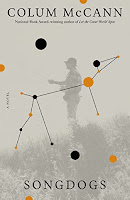Conor, in his early 20s, travels with a monstrous backpack in a passive, desultory way, and finally arrives at his father’s home in a small town in western Ireland. He surprises him by showing up, and the main current-day narrative kicks off. This story, as Conor tells it, becomes the central thrust of the novel, almost as if by default. Conor vividly remembers his mother, a captivating señorita from a sun-blasted town in eastern Mexico. Michael, Conor’s father, cut a swath through the remote town after mustering our from the war, and settled down with 19 year-old Juanita.
The narrative thus follows two time lines, one current, and one in the past. In the present-day story Conor finds Michael, who now lives a diminished, alienated life — it’s squalid: he neglects his hygiene, doesn’t do laundry, or pay any attention to the keeping his house. Their reuniting doesn’t spark any dramatic changes, but reacquaintance results in a subtle evolution between the two, where hard truths are acknowledged, and new understandings bloom.
This novel contains the vividly personal language of the questing youth. It contrasts sharply with the received platitudinal wisdom spouted by the hermit-like father. Don’t conclude that this is a depressing read; it’s way too vivid and plotted far too cleverly. It has as its core a classic human story of a family splintered by strong personalties and faded dreams. To catch an early example of McCann’s undeniable gifts, Songdogs serves beautifully.






















